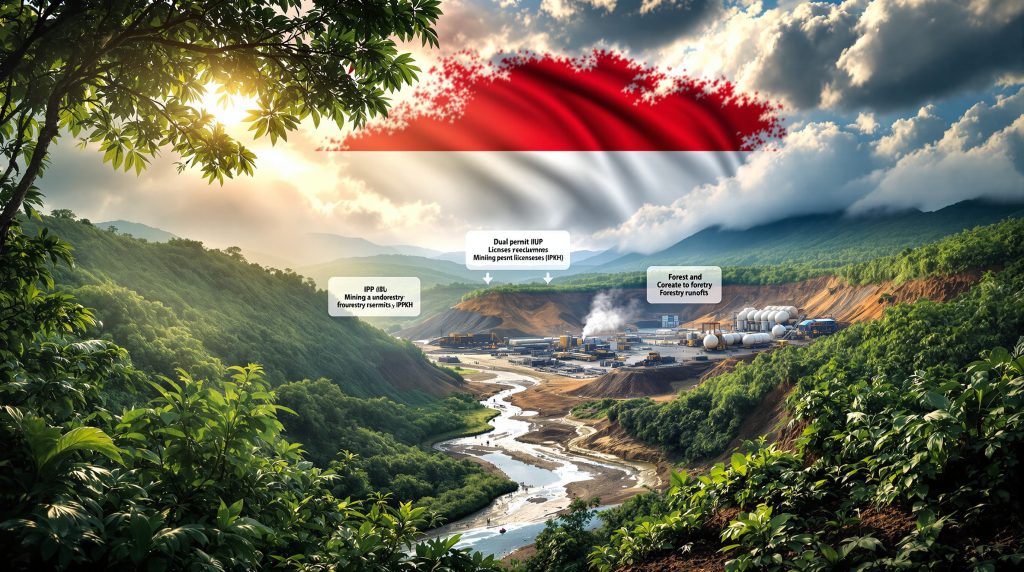Indonesia's Forestry Permit Crisis: The Legal Tangle Threatening Nickel Mining Operations
The Dual Permit Requirement in Indonesian Mining
Indonesia's nickel mining sector faces a growing regulatory challenge as government authorities crack down on operations lacking proper forestry permits. Despite holding valid mining licenses, several major nickel producers have had land seized for failing to secure the required "borrow-to-use" forestry permits, creating significant disruption in the world's largest nickel-producing nation.
Indonesia's regulatory framework requires mining companies to obtain two distinct authorizations when operating in forest areas: mining business permits (IUP) that grant extraction rights, and forestry "borrow-to-use" permits (IPPKH) that allow operations within designated forest zones. This dual-permit system reflects Indonesia's attempt to balance resource development with forest conservation, but many companies have proceeded with only mining permit basics in place.
The impact of this enforcement has been immediate and measurable. Following the announcements of land seizures, London Metal Exchange nickel prices increased 1.32% to $15,350 per metric ton, while Shanghai Futures Exchange nickel prices rose 1.28% to 121,800 yuan per ton, indicating market concerns about potential supply disruptions.
What Land Has Been Seized in the Recent Government Crackdown?
Major Seizures from Prominent Nickel Producers
Recent enforcement actions have targeted several significant operations. PT Weda Bay Nickel had 148 hectares (366 acres) seized on Halmahera Island due to lack of forestry permits. The company's total concession spans approximately 45,000 hectares (111,000 acres), making the seized portion relatively small but symbolically significant.
Similarly, PT Tonia Mitra Sejahtera lost 173 hectares (427 acres) in Southeast Sulawesi for the same regulatory violation. Tonia's total mining permit covers nearly 5,900 hectares (14,580 acres) according to ministry data.
Regional news channels have documented the enforcement actions, showing authorities—some in military uniform—installing government control signage at the seized areas and physically closing off access to the land.
Scale of the Compliance Problem
The scale of the problem extends far beyond these two cases. A government task force has identified a staggering 4.2 million hectares (10 million acres) managed by 51 companies that lack proper forestry permits, suggesting the recent seizures may be just the beginning of a larger enforcement campaign.
These initial enforcement actions appear to be strategic, targeting high-profile operations to send a clear message about the government's seriousness in addressing permit violations.
Why Is Indonesia Intensifying Enforcement Now?
Presidential Directive and Policy Shift
The enforcement campaign comes directly from the highest levels of government. President Prabowo Subianto recently announced that more than 1,000 mining operations have been identified as operating illegally. This statement signals a top-down directive to address natural resource exploitation that fails to comply with Indonesia's environmental regulations.
Senior prosecutor Febrie Adriansyah from the attorney general's office has confirmed the task force actions and provided statistics on the scope of violations, demonstrating coordination between multiple government agencies in this enforcement effort.
The timing appears strategic, coming as Indonesia seeks to strengthen its position in global mineral markets while also addressing environmental concerns that have grown alongside the expansion of the nickel sector.
Market Impact of the Crackdown
The enforcement actions have already affected global nickel markets. The immediate price increases on both the London Metal Exchange and Shanghai Futures Exchange reflect market concerns about potential supply disruptions from the world's dominant nickel producer.
While these initial seizures affect relatively small areas of the overall mining footprint, the market reaction suggests investors and traders recognize the potential for wider enforcement that could impact production volumes.
How Are Companies Responding to the Permit Crisis?
Corporate Reactions and Mitigation Strategies
Companies affected by the seizures have responded with varying levels of public engagement. According to an anonymous company source, Weda Bay Nickel is seeking clarification from the government task force while assessing the situation.
Eramet Indonesia, part-owner of Weda Bay, has publicly committed to complying with all applicable regulations. In a formal statement, the company expressed respect for the decisions of Indonesian authorities and pledged to support PT Weda Bay Nickel in working closely with authorities to ensure all activities meet legal and regulatory standards.
Other affected miners have been less public about their responses, but industry observers suggest many companies are likely expediting forestry permit applications to prevent further seizures.
Operational Impacts and Continuity Plans
The immediate operational impact varies by company. Eramet claims the seized Weda Bay plot was a rock quarry for construction material, not the main mining extraction site, and has stated it does not expect significant impacts on overall operations.
The company has also noted that the government has physically closed off the seized area, requiring immediate operational adjustments. For companies where seized land includes active mining areas, the impact could be more substantial, potentially affecting production volumes and supply chain commitments.
What Are the Broader Environmental and Social Implications?
Environmental Concerns Driving Regulation
The forestry permit requirement stems from legitimate environmental concerns. Indonesia's nickel mining industry has been associated with significant deforestation across the archipelago, particularly in biodiversity-rich areas like Sulawesi and Halmahera.
Mining operations without proper environmental oversight have caused soil erosion and watershed damage in several regions. Processing facilities, particularly those using high-pressure acid leaching (HPAL) technology for producing battery-grade materials, have been linked to water pollution affecting local communities.
The forestry permit system is designed to ensure mining activities include proper environmental management plans, reforestation commitments, and eventual restoration of mined land to forest status.
Social License and Community Relations
Companies operating without proper permits often face challenges with social license to operate. Local community opposition due to environmental impacts has grown more organized and vocal in recent years, particularly where mining operations affect water quality or availability.
Indigenous rights conflicts over traditional forest lands have become more prominent in Indonesia's resource development discussions. Mining companies increasingly recognize that full regulatory compliance, including forestry permits, is essential for maintaining positive community relations.
Reputation damage from permit violations can affect relationships with international buyers and investors, particularly as global supply chains face greater scrutiny for environmental and social governance standards.
How Does This Affect Indonesia's Position in Global Nickel Markets?
Strategic Importance of Indonesian Nickel
Indonesia plays a dominant role in global nickel production and processing. The country's reserves and production capacity have made it an essential supplier to both traditional stainless steel markets and emerging battery supply chains.
Indonesia's downstream processing capacity for battery-grade materials has grown significantly in recent years, positioning the country as a crucial player in electric vehicle supply chains. This strategic position gives the government leverage to enforce regulations while still attracting investment.
The nickel industry's importance to Indonesia's economy creates a delicate balance between strict regulatory enforcement and maintaining production levels that support economic growth targets.
Balancing Regulation and Market Position
The government faces a delicate balancing act in this enforcement campaign. While strengthening environmental regulations and permit compliance, officials must consider how enforcement actions might affect Indonesia's competitive position in global nickel markets.
Too aggressive enforcement could temporarily reduce production and potentially drive some investment to alternative jurisdictions. However, establishing clear regulatory expectations may ultimately strengthen Indonesia's position as a responsible supplier in markets increasingly concerned with sustainability credentials.
The selective approach to initial enforcement—targeting specific plots rather than shutting down entire operations—suggests the government is attempting to signal seriousness about compliance while minimizing market disruption.
What Steps Can Mining Companies Take to Ensure Compliance?
Navigating the Permit Process
Companies operating in Indonesia's nickel sector should conduct comprehensive audits of all permits and licenses across their operations to identify any compliance gaps. This process should include detailed mapping of operational footprints against permit boundaries.
Engaging early with forestry authorities when planning new developments can prevent costly delays and enforcement actions. Companies should build permitting timelines that realistically account for the often lengthy process of securing forestry permits, which typically takes 6-12 months but can extend longer for sensitive areas.
Implementing robust environmental management systems that exceed minimum requirements can facilitate permit approvals and demonstrate commitment to sustainable operations. These systems should include comprehensive monitoring of impacts on forests, water resources, and biodiversity.
Maintaining transparent relationships with regulatory agencies through regular communication and proactive disclosure of operational activities helps prevent misunderstandings that could lead to enforcement actions.
Best Practices for Sustainable Nickel Mining
Forward-thinking companies are adopting approaches that go beyond minimum compliance requirements. Reforestation programs that exceed regulatory minimums can build goodwill with communities and regulators while creating positive environmental outcomes.
Advanced water treatment systems to prevent contamination of surrounding watersheds represent an important investment in both regulatory compliance and community relations. These systems are particularly important for processing facilities using acid leaching or other potentially polluting technologies.
Community benefit-sharing arrangements that build local support through employment, infrastructure development, and social programs help create advocates rather than opponents. These programs are increasingly seen as essential rather than optional by leading mining companies.
Transparent reporting on environmental performance through internationally recognized standards demonstrates commitment to accountability and can differentiate responsible operators from those seeking to avoid regulatory requirements.
What Does the Future Hold for Indonesia's Nickel Industry?
Regulatory Outlook and Enforcement Trends
The current enforcement trend suggests continued scrutiny of permit compliance across the mining sector. Companies should expect increased inspection frequency and more rigorous verification of permit boundaries and conditions.
There may be potential expansion of enforcement to other minerals beyond nickel as the government applies lessons learned from the current campaign. This could affect cobalt, copper, and other mineral operations in forest areas.
Stricter environmental impact assessment requirements for new projects are likely, with more detailed analysis of forest impacts and more rigorous restoration commitments. Companies planning new developments should prepare for extended permitting timelines and more detailed requirements.
Market Adaptation and Industry Evolution
The industry will likely respond with consolidation as smaller, non-compliant operators exit the market or are acquired by larger companies with the resources to ensure full regulatory compliance. This could accelerate the trend toward dominance by a smaller number of large players.
Premium pricing for nickel produced under fully compliant operations may emerge as buyers seek to minimize supply chain risks related to regulatory enforcement. This could create market incentives that reward companies investing in comprehensive permitting and environmental management.
Increased investment in environmental technologies and waste management practices is expected as companies recognize these as essential operating costs rather than optional extras. This may include advanced monitoring systems, restoration technologies, and specialized environmental staff.
Greater emphasis on ESG credentials to secure international financing will drive improved practices as capital providers increase scrutiny of regulatory compliance. Companies with strong permit status and environmental records will likely enjoy preferential access to capital markets.
FAQs About Indonesia's Nickel Mining Permit Crisis
What is a "borrow-to-use" forestry permit?
A "borrow-to-use" forestry permit (IPPKH) is a specialized license that allows companies to temporarily use designated forest areas for non-forestry activities like mining. The permit includes requirements for environmental management, reforestation, and eventual return of the land to forest status.
The term "borrow-to-use" reflects the philosophy that forest land is only temporarily converted for mining purposes and must be restored afterward. These permits typically include specific timelines for restoration activities and may require financial guarantees to ensure completion.
Can companies continue operating while applying for missing forestry permits?
Generally, no. Indonesian regulations require both mining and forestry permits to be in place before operations begin in forest areas. Companies found operating without proper forestry permits face land seizures and potential governance and legal risks.
The recent enforcement actions demonstrate that the government is not allowing grace periods for companies to continue operations while permits are pending. Companies in violation should expect immediate enforcement rather than tolerance during application processes.
How long does it typically take to obtain a forestry permit in Indonesia?
The process typically takes 6-12 months but can extend to 18+ months depending on the complexity of the application, the sensitivity of the forest area, and the company's environmental management plan. The timeline has been a source of frustration for mining companies.
Factors that can extend the timeline include the conservation status of the forest area, the presence of protected species, community objections, or incomplete application materials. Companies should plan development timelines with these potential delays in mind.
Are international mining companies also affected by these permit requirements?
Yes, all companies operating in Indonesia, regardless of ownership, must comply with the same regulatory requirements. Several international mining companies with Indonesian operations have been working to ensure full compliance with both mining and forestry regulations.
The recent seizure of land from Weda Bay Nickel, which is partly owned by French company Eramet, demonstrates that foreign investment does not exempt operations from enforcement actions. International companies must navigate the same regulatory landscape as domestic operators.
Conclusion: Regulatory Compliance as the New Normal in Indonesian Nickel Mining
The recent land seizures from major nickel producers mark a significant shift in Indonesia's approach to regulating its vital nickel industry. As the government intensifies enforcement of forestry permit requirements, mining companies must adapt by prioritizing comprehensive regulatory compliance alongside production goals.
This regulatory tightening reflects Indonesia's evolving approach to natural resource management—balancing its position as the world's dominant nickel producer with growing environmental concerns and sustainable development objectives. For mining companies, investors, and industry evolution insights suggest that proper permits are no longer optional but essential for operational continuity in Indonesia's nickel sector.
Companies that adapt quickly to this new enforcement reality by securing all necessary permits and implementing best environmental practices will be best positioned to thrive in Indonesia's evolving regulatory landscape. Those that continue operating without proper forestry permits risk not only land seizures but also reputational damage and loss of investor confidence.
The lack of forestry permits in nickel mining operations in Indonesia represents not just a regulatory challenge but an opportunity for the industry to improve its environmental performance and social license to operate. As enforcement continues, the distinction between compliant and non-compliant operators will likely become an increasingly important factor in company valuations and market access.
Moving forward, companies must also develop comprehensive mine reclamation strategies to ensure that forest areas can be properly restored after mining activities are complete, further demonstrating their commitment to sustainable practices in Indonesia's evolving regulatory landscape.
Want to Spot the Next Major ASX Discovery Before the Market Does?
Discovery Alert's proprietary Discovery IQ model instantly identifies significant mineral discoveries on the ASX, transforming complex data into actionable investment opportunities for traders and investors alike. Explore how historic discoveries have generated substantial returns by visiting the Discovery Alert discoveries page and position yourself ahead of the market.




